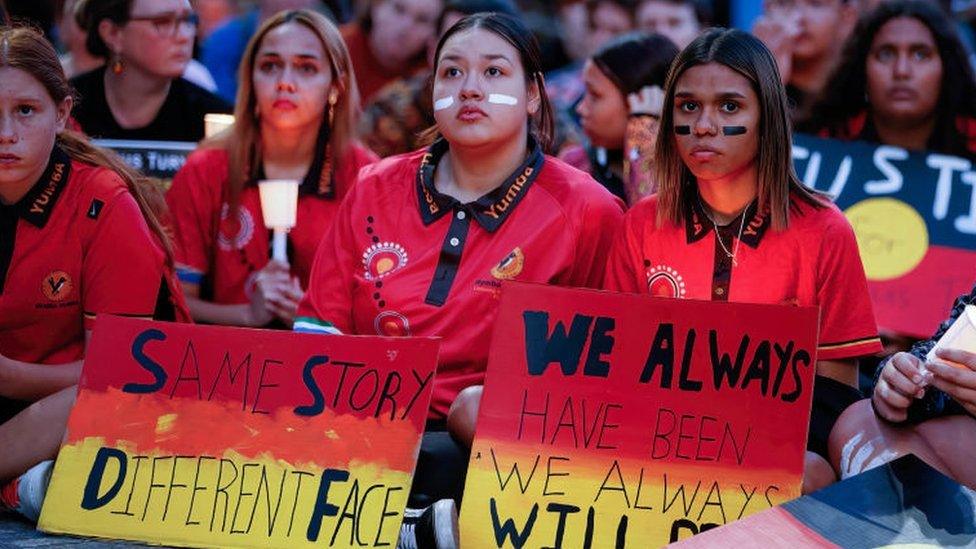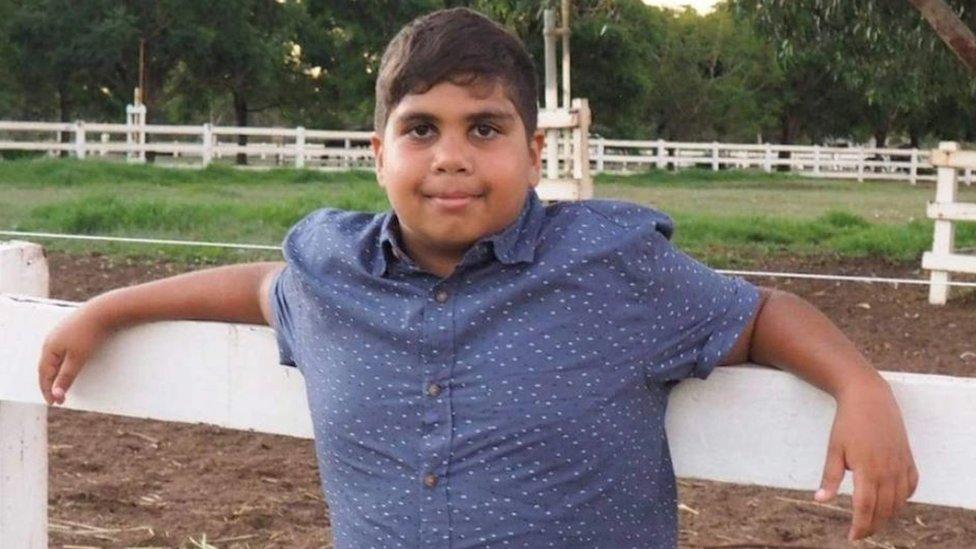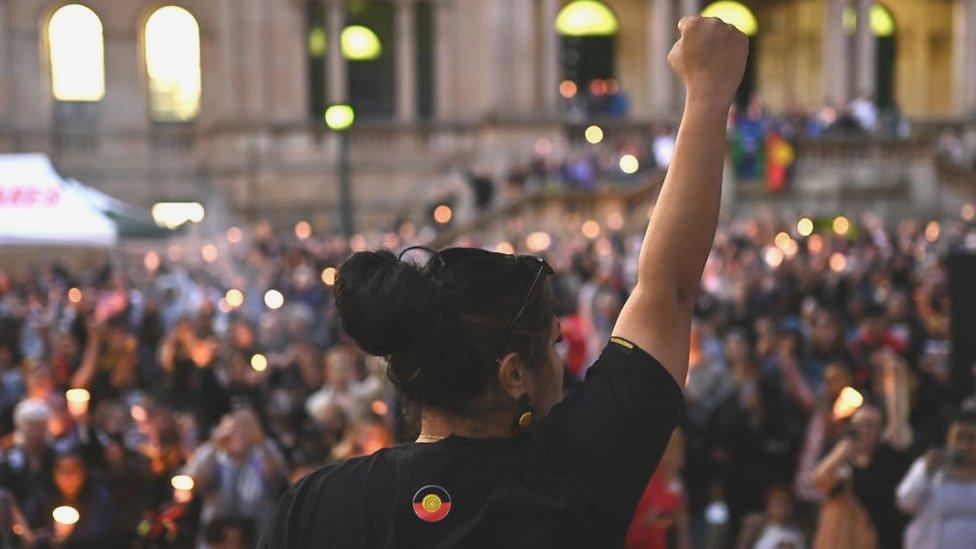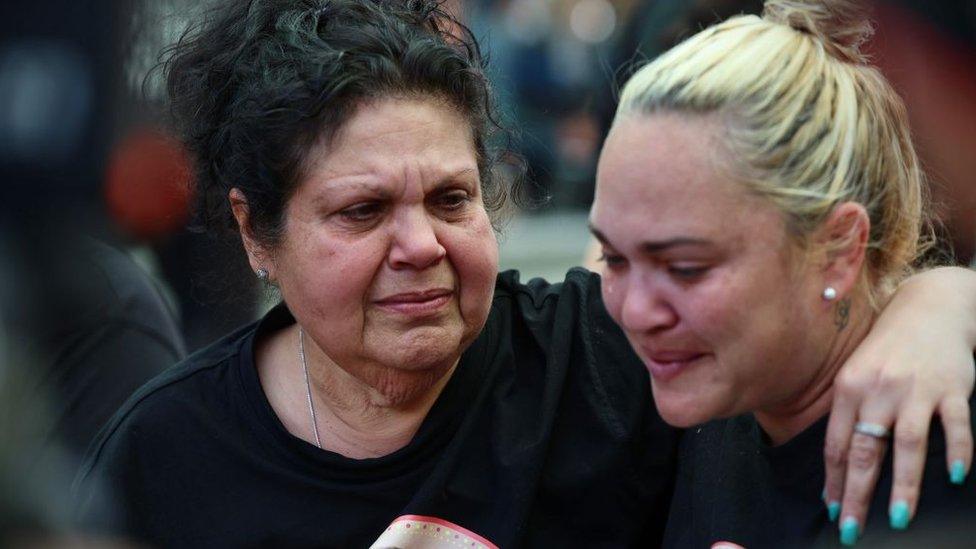Cassius Turvey: Aboriginal boy's killing puts spotlight on racism in Australia
- Published

Cassius Turvey's alleged murder has prompted vigils around Australia
Three weeks ago, Aboriginal teenager Cassius Turvey was walking home from his Perth school with friends when a stranger allegedly pulled up in a utility vehicle and told the group to run.
What happened next has shocked Australia and posed hard questions, many say, about pervasive racism in the country.
Passengers in the car allegedly chased down the Aboriginal boys - who were wearing their school uniforms - before two were violently attacked.
One victim was an already injured 13-year-old whose own crutches were used to beat him, causing bruising to his face, authorities say.
The other was 15-year-old Cassius, who police believe was assaulted with a metal pole.
The Noongar Yamatji boy died 10 days later, after suffering seizures and two strokes from his serious head injuries.
Warning for Aboriginal and Torres Strait Islander readers: this article contains images of someone who has died.
A 21-year-old white man, Jack Steven James Brearley, has been charged with murdering Cassius and assaulting the other boy.
Police have not ruled out further charges against Mr Brearley or others.
Anger grows
Western Australian (WA) police say it was a possible vigilante attack after Mr Brearley's car was damaged the day before.
But there is nothing to suggest Cassius and his friends were involved in the earlier incident, police say, nor any indication they knew their alleged attackers.

Cassius was "the heart and soul" of his community, his mother says
Officers are investigating claims the boys were racially abused before the attack, but Commissioner Col Blanch has urged the community not to speculate about a motive or "jump to conclusions".
"It may be a case of mistaken identity, it might be a case of the wrong place at the wrong time," he told a Perth radio station last week.
But others - including Prime Minister Anthony Albanese - have said the attack was "clearly" racially motivated.
Noongar community leaders wrote in an open letter: "Cassius was not 'in the wrong place at the wrong time'. He was in his school uniform with his friends in broad daylight."
Mr Blanch has since said he regrets using those words, which were widely criticised.
But the killing has sparked national grief and anger. Thousands of people have attended vigils for Cassius in more than two dozen places across Australia, with events also being held in the US and New Zealand.

People gathered for vigils in every state capital on Wednesday
Even before the alleged attack, Indigenous communities were scared for their kids, according to Emily Farmer. Her son was among those walking home with Cassius.
"I've always told [my child]: 'You're an Indigenous boy - they're going to look at you and think all these awful things. Just try and be smaller,'" she told National Indigenous Television programme The Point, external.
"I hate that I had to explain that to my son at this age."
'Blight on the nation'
For many, it has evoked memories of high-profile killings of other Indigenous teenagers - such as 14-year-old Elijah Doughty.
Six years ago in WA town Kalgoorlie, he was run over by a man in a 4x4 who believed the teenager had stolen a motorcycle from his house. The man was acquitted of manslaughter but convicted of a lesser charge - driving dangerously causing death.
Human rights lawyer Hannah McGlade says she is also reminded of other deaths: Louis St John Johnson, 19, in 1992; Cleon Jackman, 14, in 1999; and Thomas 'TJ' Hickey, 17, in 2004.
All were attacked or pursued in racially discriminatory scenarios that would not happen to white children, according to Dr McGlade, a member of the UN Permanent Forum on Indigenous Issues.
"This is shameful. It's an absolute blight on the nation that young kids can be murdered like this," Dr McGlade says.

Cassius's mother Mechelle Turvey (L) with Emily Farmer at a rally in Perth
Aboriginal and Torres Strait Islander people suffer disproportionate rates of violence. Statistics show in some parts of the country they are six times more likely to be assaulted than non-Indigenous people.
"Australia does have a shocking reputation around the world for this kind of violence," Dr McGlade says.
Mother's heartbreak
Mechelle Turvey says her son was "the heart and soul" of his community - jovial, kind and larger than life.
"There was no reason for anyone not to like him," she said in a statement read out at vigils across the country.
He was so concerned about negative stereotypes of Indigenous young people that he started a 'pay-what-you-can' lawnmowing business at the age of 13.
"Cassius wanted the community to see that young people weren't bad people and they could do good things," Ms Turvey said.
Ms Turvey wants changes to be made in Cassius's name: including investments in youth programmes, bullying awareness and anti-racism initiatives.
And she wants justice over his death. Only a month ago she buried her husband, who died of cancer. And now she's burying her son.
"I'm heartbroken... for no reason, I've lost him," she said through tears outside a court on Monday.
"He should still be with us today, going to school, playing footy and living a long life."